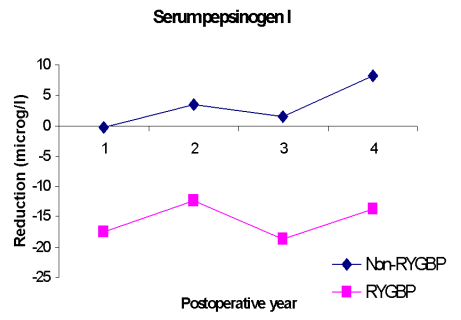# 103823 Abstract ID: 103823 Decrease in Serum Pepsinogen I Following Roux-en-y Gastric Bypass
Magnus Sundbom, Erik Mardh, Sven Mardh, Margareta Ohrvall, Sven Gustavsson, Uppsala, Sweden; Linköping, Sweden
Background: Concerns about dysplastic epithelial changes in the excluded stomach after Roux-en-y Gastric bypass (RYGBP) have been raised. Due to obvious anatomical reasons the excluded stomach is not readily available for endoscopic biopsy. We have used serological tests for determination of type and severity of gastritis before and after RYGBP. Methods: 34 patients (median 38 years, BMI 42) had been operated on with RYGBP >4 years previously. 32 patients (42 years, BMI 44) operated on with VBG or Gastric banding served as controls. Serum was obtained before operation and 1, 2, 3 and 4 years postoperatively. Pepsinogen I was determined using GastrosetTM PGI (Orion). Antibodies towards H. pylori and H,K-ATPase were determined with in house ELISA. Results: In both groups pepsinogen was within the normal range before operation (with one exception). In contrast to the findings in VGB and Gastric banding patients, pepsinogen levels were significantly (p < 0,001) lower in the RYGBP group when measured at 1, 2 and 3 years postoperatively. Moreover 8 RYGBP-patients developed levels below the reference range. Occasional patients in both groups had increased titre of antibodies against H.pylori and H,K-ATPase but these abnormalities remained unchanged throughout the study. Conclusion: As evaluated 1,2 and 3 years postoperatively RYGBP patients showed a typical decrease in pepsinogen levels. Low pepsinogen has been linked to atrophic gastritis with risk for gastric cancer. However, the absence of food stimulation in the excluded stomach may contribute to low pepsinogen levels.

|
 500 Cummings Center
500 Cummings Center +1 978-927-8330
+1 978-927-8330
 +1 978-524-0461
+1 978-524-0461